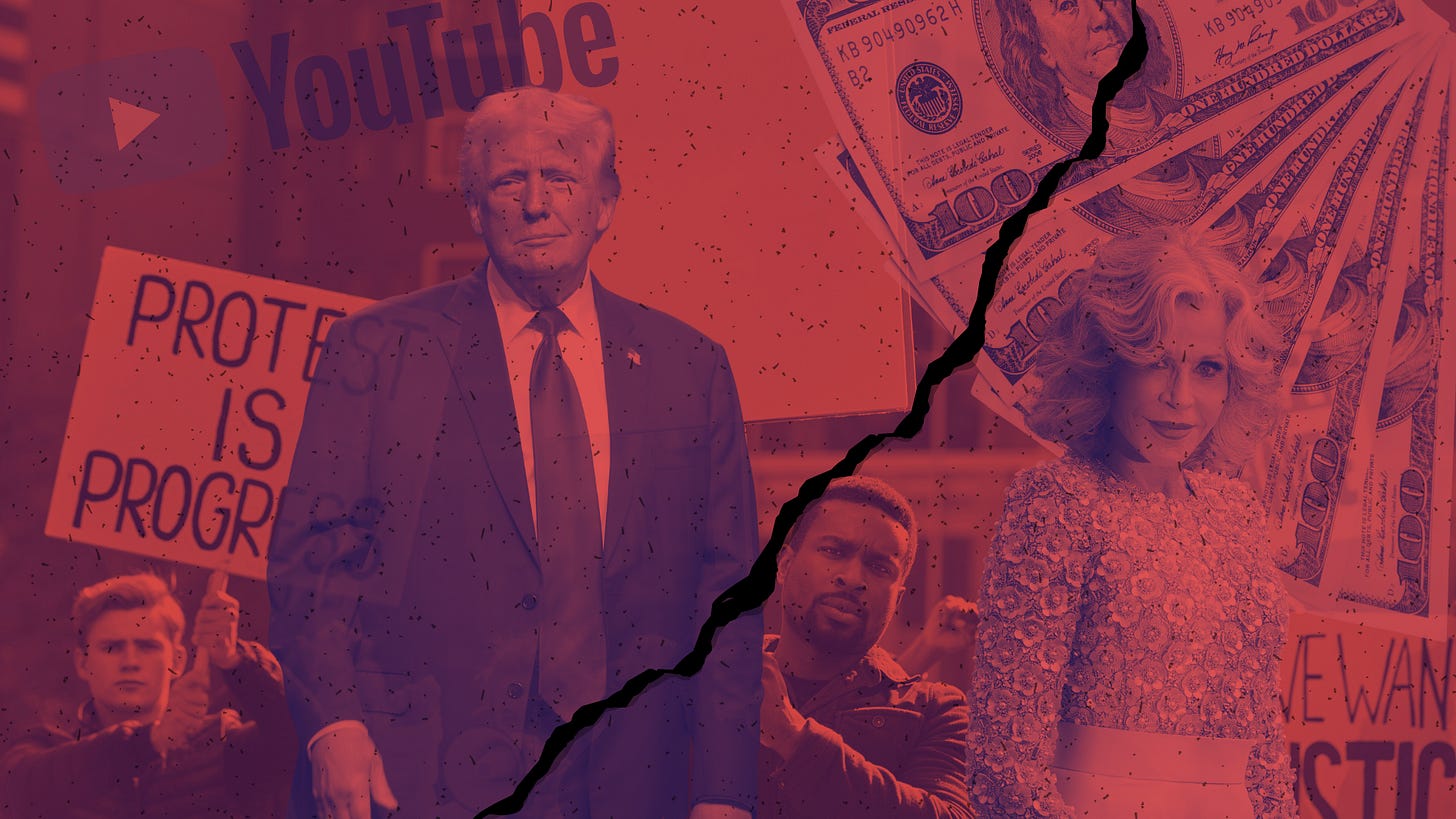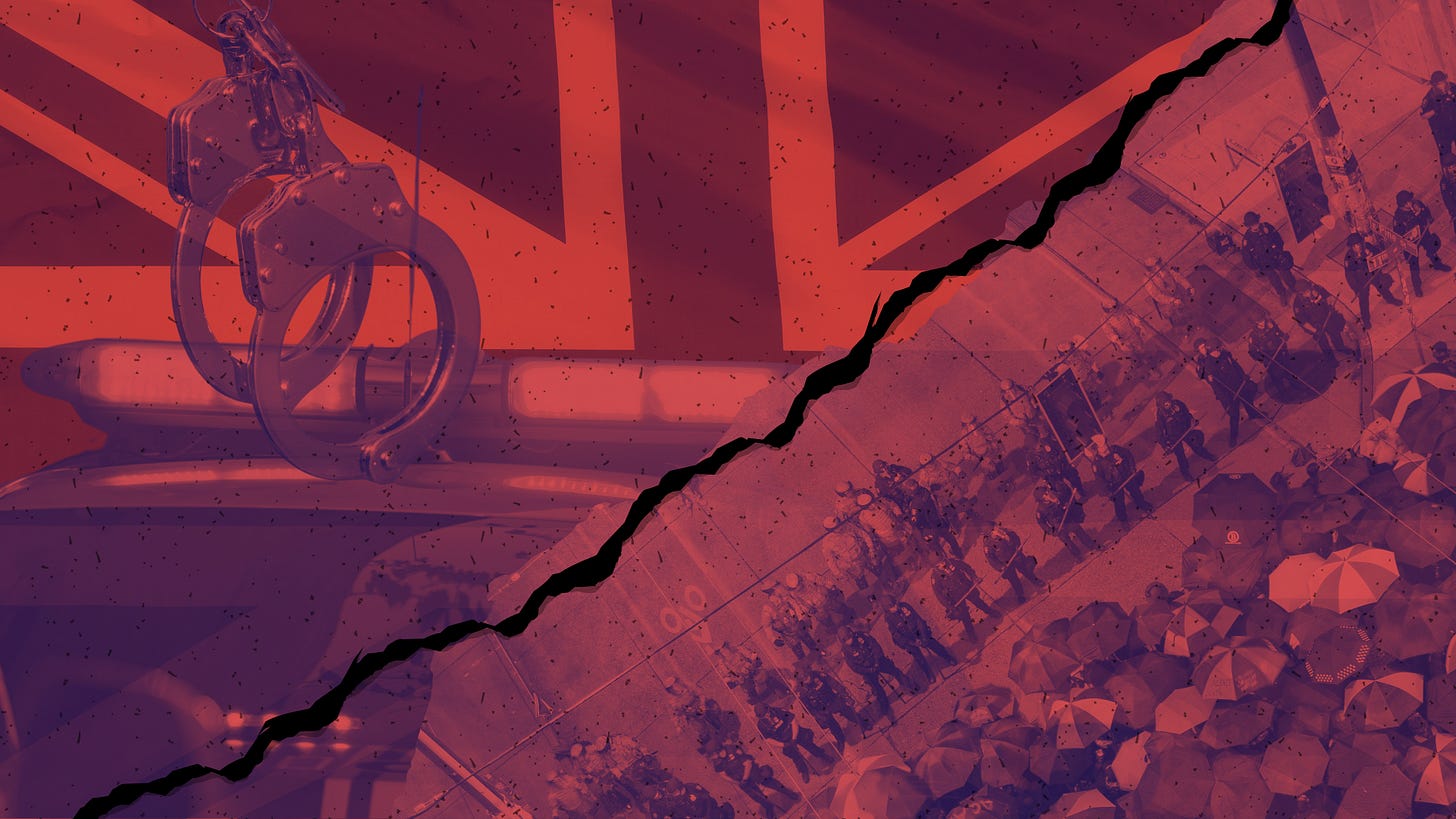Judge Rules Trump Illegally Targeted Noncitizen Students & Tunisia Issues Death Sentence for Social Media Posts | The Free Flow 10/9/25
Judge rules Trump administration illegally targeted noncitizen student protesters, Denmark proposes social media ban for children under 15, protests turn violent in Morocco, and more.
This Week At a Glance 🔎
— 🇺🇲 Judge Rules Trump Administration Illegally Targeted Noncitizen Student Protesters
— 🇩🇰 Denmark Proposes Social Media Ban for Children Under 15
— 🇲🇾 Malaysia Advises Social Media Platforms to Implement Identity Check System
— 🇹🇳 Tunisia Issues Death Sentence Over Facebook Posts
— 🇲🇦 Moroccan Authorities Violently Clash with Youth Protestors
First of All 🇺🇲

» Judge Rules Trump Illegally Targeted Noncitizen Student Protesters
On September 30, a federal judge in Massachusetts ruled that the Trump administration had systematically silenced noncitizen students protesting in support of Palestine by threatening “ideological deportations.”
Details:
In a 161-page opinion, Judge William G. Young found that the administration had unlawfully infringed on noncitizens’ constitutional rights and stated that the remedy to be imposed would be decided at a later date.
Judge Young found the list of the administration’s actions presented by a coalition of academic and civil rights organizations had created a climate of fear through “retribution” and “bullying.”
Our Take: Noncitizens present in the US legally have the same First Amendment protections as everyone else. Governments campaign to suppress viewpoints they don’t favor by marking them as national security threats. — Ashkhen Kazaryan
» White House Attempts to Tie University Funding to Campus Speech Rules
The Trump administration has sent a list of operating principles called the “Compact for Academic Excellence in Higher Education” to nine universities for them to agree to in exchange for “multiple positive benefits,” including “substantial and meaningful federal grants.”
Universities include Vanderbilt University, Dartmouth College, the University of Pennsylvania, the University of Southern California, Massachusetts Institute of Technology, the University of Texas at Austin, the University of Arizona, Brown University, and the University of Virginia.
The Compact:
It asks universities to ensure “a vibrant marketplace of ideas on campus” and abolish departments that “purposefully punish, belittle, and even spark violence against conservative ideas.”
If universities sign and then violate the terms of the compact, they could be forced to return any federal government funds or private contributions that year.
Universities that agree would be required to hire an independent auditor to conduct anonymous polling among faculty, students, and staff to evaluate compliance, which the Department of Justice would then review.
It also asks universities with an endowment of $2 million per undergraduate student to waive tuition for students who pursue “hard science” programs.
Other demands include banning the use of race or sex in hiring and admissions, freezing tuition for five years, capping international undergraduate enrollment at 15%, requiring applicants to take the SAT or a similar test, and addressing grade inflation.
» YouTube Settles with Trump for $24.5 Million
YouTube agreed to pay $24.5 million to settle a lawsuit with President Donald Trump, after he accused the platform of censoring him and his supporters.
Details:
Trump sued YouTube’s parent company, Alphabet, as well as Meta and Twitter, in 2021, shortly after they suspended his accounts following the Capitol riot on January 6.
The company is not required to admit fault, but it must pay $22 million to the Trust for the National Mall to help fund the construction of the White House State Ballroom.
$2.5 million will go to a group of Trump supporters, including the American Conservative Union and author Naomi Wolf.
Our Take: This settlement joins a long list of examples of private actors, who absolutely have First Amendment rights to make the editorial decisions they are being sued for, deciding to settle as a pragmatic path for their business. — Ashkhen Kazaryan
» Jane Fonda Revives Committee for the First Amendment
Jane Fonda has relaunched the Committee for the First Amendment, an initiative founded initially in the 1940s by her father, Henry Fonda, to protect free speech in the face of McCarthyism.
Details:
The Committee has already received the support of more than 550 celebrity names.
“The McCarthy Era ended when Americans from across the political spectrum finally came together and stood up for the principles in the Constitution against the forces of repression,” Fonda said.
“Those forces have returned. And it is our turn to stand together in defense of our constitutional rights,” she added.
The news follows lawsuits against media and, most recently, the suspension of Jimmy Kimmel Live! After Kimmel’s comments about the assassination of Charlie Kirk.
The Digital Age 🤖
» Denmark Proposes Social Media Ban for Children Under 15
On October 6, Danish Prime Minister Mette Frederiksen announced the government wants to introduce a ban on several social media platforms for children under the age of 15.
Details:
Frederiksen said parents should be able to give permission for children to have accounts only from the age of 13.
“Mobile phones and social media are stealing our children’s childhood,” Frederiksen said in her opening remarks to the Danish parliament. “I hope that you hear in the chamber will help tighten the law so that we take better care of our children here in Denmark.
She did not give further details on what a ban would entail, and a minor’s social media ban does not appear on the legislative agenda for the upcoming year.
» Malaysia Advises Social Media Platforms to Implement Electronic Identity System
Malaysian authorities have advised all social media platform providers to implement electronic Know-Your-Customer (eKYC) verification using government-issued documents such as MyKad, a passport, or MyDigital ID.
Details:
Communications Minister Datuk Fahmi Fadzil said the identity system aims to reduce online fraud and prevent children under 13 from opening their own social media accounts.
“For now, we are encouraging it, but when the Online Safety Act comes into effect at the end of this year or early next year, it will become mandatory,” Fadzil said.
The ONSA is set to take effect at the end of 2025 or early 2026.
Platforms such as Facebook, Instagram, WhatsApp, Telegram, TikTok and others have been asked to incorporate the system.
The Brussels Effect: Europe and Beyond 🇪🇺
» UK Expands Police Powers to Restrict Repeat Protests
The UK government has announced the expansion of police powers to restrict repeat protests after nearly 500 protesters were arrested.
Background:
The expansion of powers follows the arrest of nearly 500 protesters at an October 4 protest in Trafalgar Square on suspicion of supporting the proscribed terrorist group, Palestine Action.
All 493 arrested demonstrators were later released on bail.
Defend Our Juries, the organizers of the protest, had been asked to reconsider their plans after two men were killed at the Heaton Park Hebrew Congregation synagogue on Yom Kippur.
About the expansion:
Senior officers will be able to consider the “cumulative impact” of previous protests, and instruct organizers to hold demonstrations elsewhere or for a limited duration.
Parliament member Kemi Badenoch said, “We believe in free speech but that has to be within the bounds of the law, if protests are used to intimidate, to incite hatred then that is not protest.”
Free Speech Recession 🌍
» Tunisia Issues Death Sentence Over Facebook Posts
A court in Nabeul, Tunisia, sentenced 56-year-old Saber Chouchane to death for allegedly insulting President Kais Saied and “attacking state security” on social media.
Details:
Chouchane, a manual laborer, was arrested last year after posting remarks criticizing the president on Facebook.
Tunisian courts have not carried out an execution in over 30 years, though they have occasionally issued death sentences.
Chouchane has lodged an appeal, emphasizing that the case is an example of the legal system’s disturbing crackdown on speech.
» Moroccan Authorities Violently Clash with Youth Protestors
Protests organized by young people in Morocco escalated into violent clashes with authorities, leaving at least three dead, dozens injured, and more than 400 arrested.
Details:
The protests erupted in response to failing public services, high unemployment, and corruption amidst vast government spending on preparations for the 2030 World Cup.
The demonstrations, organized through social media as part of the “Gen Z 212” movement, took place across several cities in late September.
By September 30, the peaceful protests had escalated after video evidence showing Moroccan security forces driving vehicles into protestors, using excessive force to arrest demonstrators, and detaining bystanders during peaceful demonstrations surfaced.
While the videos showed officers using excessive force before reports of violence at any protests occurred, demonstrators then set vehicles ablaze and vandalized public buildings in response.
Many protestors, including minors, face charges under Article 591 of the Moroccan Penal Code, which criminalizes participation in gatherings deemed as violent, although several were arrested before the escalation.
» Crackdowns on Protesters, Activists, and Media in Georgia
An escalating crackdown on protests in Georgia has resulted in the criminal prosecution of at least 76 people, with more than 60 imprisoned, between April 2024 and August 2025, according to Transparency International Georgia.
Details:
The crackdown surged after largely peaceful protests in November 2024, which began when the government halted talks about joining the European Union, shortly after the election that was allegedly rigged was won by the Georgian Dream party.
Amnesty International reported at least 400 people detained within two weeks in November 2024, and at least 300 claimed they were severely beaten.
The ruling Georgian Dream party has also frozen the bank accounts of seven rights groups, sued several independent TV channels, revealed plans to declare the main opposition party, United National Movement, unconstitutional, and fined journalists at protests.
Ashley Haek is a communications coordinator and research assistant at The Future of Free Speech.
Ava Sjursen is a communications intern at The Future of Free Speech and a student at Boston College studying communications and political science.
Ashkhen Kazaryan is a Senior Legal Fellow at The Future of Free Speech, where she leads initiatives to protect free expression and shape policies that uphold the First Amendment in the digital age.






